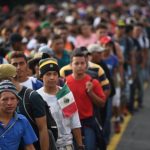Instagram. A family in black and white, with luggage in an airport. The legend says it’s Santiago de Chile, September 40 years ago. In a girl caught by the camera, the woman that the owner of the instagram profile will become. A week later the same photo was taken, but with my family instead, at the airport of Buenos Aires. When we left Argentina and her dictators towards Venezuela. Staring at the photo of my friend and at my own memories, I started typing with wet eyes, throat and stomach in one knot.
My fingers at the keyboard, then. Here and now, The Netherlands. The newspapers with the news of the thousands leaving Venezuela from yet another dictator. Can I understand, can I relate their fate to mine 40 years ago? We were heading to Venezuela but they are heading out. Their families were the ones that received us, uprooted people with couple of suitcases and no clear future. We build a life in Venezuela because all those that welcomed us, those whose children are running away today. Perhaps to Argentina. Will the people that we left behind in Argentina receive these Venezuelans now? Could they root and grow as we did? What will become of them?
How could this happen? I shout with closed lips. I can’t answer and I can’t write either. My knoted hands also hurt. I make a fist, and write no more.
Two weeks later and I still have the lines above at my throat. Yesterday’s New York Times covered another Caravan, another desperate mass of people going away from home. These are going north, from Honduras to face Trump and the unleashed dogs of prejudice and bigotry. This Caravan can´t have many illusions left about the land of the free, yet whatever hope they have is enough to push them away from the hell their homes have become. In the photos of Venezuelans I see people wrapped in blankets with the colors of the Venezuelan flag. In the photos of the Gran Caravana to the north I see other flags waved at the faces of policemen deployed to stop them, who then bow and let them pass. I wonder what it all means, those flags, those national identities that we, the ones that left long ago, still carry around, like rags, like pieces of something that we were, or still are. Those rags that we carry when we leave home.
I recall the photos to write and my hand still hurts. Nobody should be writing this, not today. I look up to the people sitting around me, in this cafe in the center of Utrecht. People going but also coming, people busy with their own business and plans, with their loves and concerns. People from many colors and shapes. I would be willing to bet that the man that walks in front of me now owns a better Spanish than mine, carrying his square body and spectacular long beard as only a Spanish can carry. The couple at my left side can’t be more Dutch, tall and blond university students that met here in the big city and are enjoying each other, timidly and perhaps at the brink of becoming lovers. The waiter inclines her straight torso to ask me if I would have another cafe, long dreadlocks moving, her terse black skin crisped at the breeze of the fall. This, like any other country today, is a country of diversity. Build by wave after wave of migrants, pushed by war and love, by curiosity or need.
Yet my throat hurts and knots.

